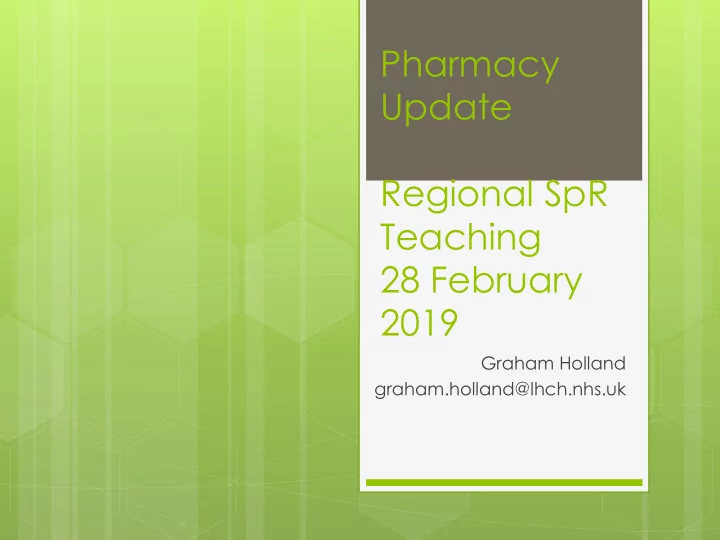

Pharmacy Update Regional SpR Teaching 28 February 2019 Graham Holland graham.holland@lhch.nhs.uk
Delving into the Weed(s)
The Review A review was launched by the Home Office 19 June 2018
The Review: Part 1 The CMO recommended that, “…the whole class of cannabis based medicinal products be moved out of Schedule 1.”
The Review: Part 2 Recommended: Cannabis-derived medicinal products of the appropriate medicinal standard should not be subjected to Schedule 1 requirements Once defined, cannabis-derived medicinal products be moved into Schedule 2
‘cannabis - based product’ for medicinal use “a preparation or other product, other than one to which paragraph 5 of part 1 of Schedule 4 applies, which: Is or contains cannabis, cannabis resin, a) cannabinol or a cannabinol derivative (not being dronabinol or its stereoisomers); Is produced for medicinal use in humans; and b) Is c) A medicinal product, or I. A substance or preparation for use as an II. ingredient of, or in the production of an ingredient of, a medicinal product”
The regulations Cannabis-based products (CBP) are: Scheduled 2* controlled drugs Unlicensed medicines* Restricted to use by clinicians listed on the Specialist Register of the GMC* *except Sativex, which is a licensed product already listed in Schedule 4
Controlled drugs Relevant legislation: The Misuse of Drugs Act 1971 as amended The Health Act 2006 The Misuse of Drugs Regulations (Safe Custody) 2001 as amended Schedule 1-5
Schedule 2 CDs Prescriptions valid for 28days No emergency supplies Prescription requirements apply…
Prescription requirements for Schedule 2 and 3 CDs Signature of prescriber 1. Date 2. Address of prescriber (must be 3. in UK) Dose 4. Formulation 5. Strength 6. Total quantity requested in 7. words Total quantity requested in 8. figures Patient name 9. Patient address 10.
“Dose” As directed • One as directed When required • 5ml when PRN required As per chart • Two PRN Titration dose • Three ampoules Weekly to be given as directed
Unlicensed medicines Process of licensing Marketing authorisation (MA) = product licence MA defines a medicine’s terms of use Outlined in its summary of product characteristics (SPC/SmPC) See www.medicines.org.uk A licensed medicine has been assessed for efficacy, safety and quality, and manufactured to appropriate quality standards
Off-label vs. unlicensed meds Off-label is the use of a licensed medicine outside of its MA Common in certain specialties May be indication/dose/route Unlicensed meds are those that do not have a MA Oxetacaine and antacid suspension Lutrol 24% with lidocaine 2% gel Levomepromazine 6mg tablets Spironolactone 25mg/ml suspension Many examples during manufacturing problems
Unlicensed medicines Prescribers should: be satisfied that an alternative, licensed medicine would not meet the patient’s needs before prescribing an unlicensed medicine be satisfied that there is a sufficient evidence base and/or experience of using the medicine to show its safety and efficacy take responsibility for prescribing the medicine and for overseeing the patient’s care, including monitoring and follow -up record the medicine prescribed and, where common practice is not being followed, the reasons for prescribing this medicine; you may wish to record that you have discussed the issue with the patient Further info: “Off - label or unlicensed use of medicines: prescribers’ responsibilities available” via www.gov.uk
Restricted to use by clinicians listed on the Specialist Register of the GMC The regulations also lay out some best practice principles: CBP should only be used where there is clear published evidence of benefit or UK guidelines In patients where there is a clinical need which cannot be met by a licensed medicine Established treatment options have been exhausted Only prescribe within your area of practice and training Decision should be agreed by the MDT Only prescribe a product where you are certain of its content and quality
Assuring quality Products are expected to fulfil the requirements of the MHRA’s specials guidance
Further considerations Unlicensed medicines and CBP are not eligible for shared-care agreements so prescription would remain under specialist supervision
Recommend
More recommend